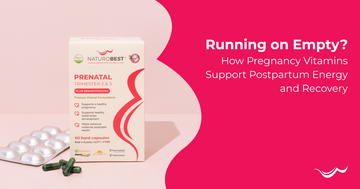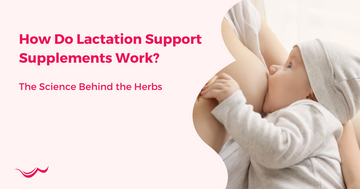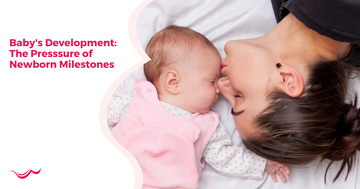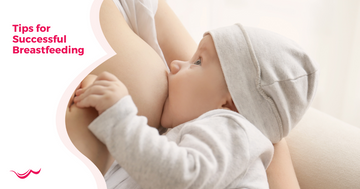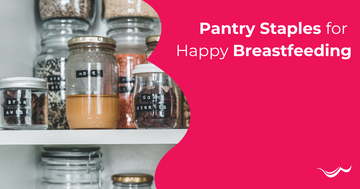
Having a baby and beginning your breastfeeding journey can be a challenging time. It can be hard to know what foods to eat and put in your pantry to support your breastfeeding journey. Taking a breastfeeding multivitamin is important to help meet your nutritional needs alongside sorting out your pantry.
Key Takeaways:
- Organise your pantry so it’s easy to access what you need close at hand.
- Increase foods high in protein and healthy fats.
- Ensure pantry is stocked up with foods to meet nutrient intake during breastfeeding.
- Breastfeeding supplements can be beneficial alongside a healthy diet.
Read on to find out more about pantry staples for breastfeeding and why sorting out your pantry is important alongside taking your breastfeeding multivitamin.
Organising Your Pantry
Before you give birth, if you can organise your pantry with a partner, family member or friend before baby arrives, you will feel one step ahead. Once you give birth your focus will rightly change to navigating your new life with baby and breastfeeding, leaving little time for much else. If you don’t have time to organise your pantry fully, create an area stocked with nutrient dense snacks which you can easily access when you need them.
How you store food is important to reduce chemical exposure for your health and baby’s health whilst breastfeeding. Minimising packaged and processed foods is important to reduce additives. Swapping to organic foods or washing fruit and vegetables properly is helpful to reduce pesticide exposure. Read this article, for more information on food storage for a healthy pantry.
Stock up Foods High in Protein & Fat
Your daily nutrient requirement for various nutrients is higher in breastfeeding compared to pregnancy. You may notice your appetite increasing and every breastfeeding mother needs an extra 500 calories per day. It is important to replace the nutrients lost in your breast milk.
A minimum of 1.2gm of protein per kg of your body weight is required whilst breastfeeding. So, a woman that weighs 70kg needs to eat a minimum of 84gm of protein every day.
Fat intake is also important to increase, especially essential fatty acids such as omega 3. Essential fatty acids are important for baby’s brain and nervous system development.
Milk choline concentration is influenced by maternal intake. Choline is important during periods of rapid growth and development in early infancy. Higher milk choline levels are associated with better infant recognition memory.
Pantry staples high in protein, choline and fats include:
- Nuts and seeds (sunflower, almonds, pumpkin etc.)
- Oils (olive oil, coconut oil, flaxseed oil)
- Organic grass-fed animal products (butter, milk, eggs, yogurt, meat, salmon, whitefish, oysters, sardines, anchovies)
- Legumes (chickpeas, kidney beans, black beans, lentils, chia seeds)
- Soy (tofu, tempeh)
Nutrient Rich Foods for Your Pantry
Breastfeeding is associated with transient bone loss in mothers to help maintain adequate calcium levels in her breast milk. It is important that breastfeeding mothers are meeting their calcium intake to prevent excessive bone loss during this time.
Foods high in calcium to stock in your pantry include:
- Organic dairy
- Sardines and canned salmon (bones included)
- Leafy greens
- Organic soy and tofu
- Tahini and sesame seeds
Zinc plays an important role in lactation and milk secretion. Selenium plays a vital role in fighting infection and regulating baby’s growth and development. Breast milk selenium reflects the amount of maternal selenium intake. The recommended amount of selenium is higher for lactating women.
Foods to stock for selenium and zinc:
- Brazil nuts
- Oats
- Rice
- Oysters
The need for iodine increases during lactation. Breastfeeding women need 270 micrograms of iodine per day. Lactating women with iodine deficiency may not be able to provide their babies with enough iodine, which places the infant at risk of iodine deficiency. Iodine deficiency is needed for the infant’s normal brain development.
Foods to stock for iodine:
- Seaweed (Nori, wakame, kombu)
- Eggs
- Beef liver or fish
Vitamin B12 is an important nutrient in breast milk. B12 deficiency may impact baby’s health and development and B12 is needed for healthy cognitive function.
Foods to stock for vitamin B12:
- Organic meats and animal products
- Nutritional yeast
Stocking your pantry full of fresh fruit and vegetables will help you to increase your intake of antioxidants and vitamin C which is important to support your immune system whilst breastfeeding to help prevent infections such as mastitis.
Breastfeeding Supplements & Stocking up Your Pantry
Ensuring your pantry is organised and stocked up with nutrient dense foods will lay the foundations for adequate nutrition during breastfeeding for a happy breastfeeding journey for both mum and baby. As postpartum can be quite difficult and tiring, it can be hard to maintain a nutrient dense pantry always stocked up. Taking a high-quality breastfeeding supplement alongside organising and stocking up your pantry is a great way to support postpartum health.
Breastfeeding herbs can also be helpful in supporting milk production and supply alongside nutrition.
Final Takeaways:
- Organise your pantry so it’s easy to access.
- Increase foods high in protein and healthy fats.
- Protein rich foods: nuts, seeds, meats, seafood, eggs, organic dairy.
- Fat rich foods: olive oil, grass fed butter, coconut cream, avocado.
We hope you find these pantry staples for breastfeeding helpful to support you on your breastfeeding journey. It is important to remember to always reach out to your lactation consultant for further support for a happy breastfeeding journey.

